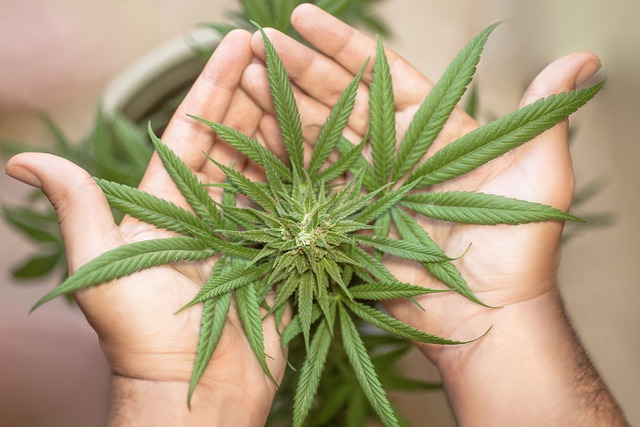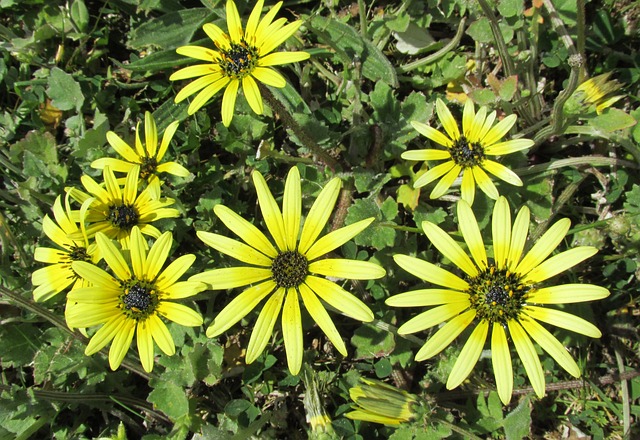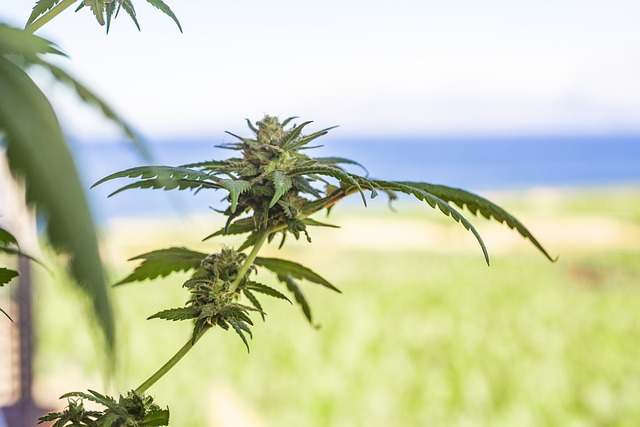
THCA flower lab reports reveal that these non-psychoactive cannabis flowers, rich in Tetrahydrocannabinolic Acid (THCA), offer significant health benefits including anti-inflammatory and neuroprotective effects due to their interaction with the endocannabinoid system. The absence of psychoactive effects associated with THC makes THCA an attractive option for medical use. Advanced lab techniques have confirmed the presence of a variety of cannabinoids and terpenes that enhance the flower's efficacy through synergistic actions. These reports provide precise concentration levels of THCA, alongside other cannabinoids like CBD and CBN, and examine the terpene profiles affecting flavor, aroma, and therapeutic effects, with myrcene, limonene, caryophyllene, and linalool being key components. The standardization process, supported by lab testing, ensures consistent products with predictable effects. THCA flower lab reports are crucial for both academic research and consumer use, offering data on potency, safety, and therapeutic promise. They also guide users on legal consumption and product safety, emphasizing the importance of sourcing from reputable providers with transparent lab test results to ensure a safe and effective wellness experience.
Exploring the multifaceted benefits of THCA flower, this article delves into the latest findings from lab reports, shedding light on its composition and cannabinoid profiles. We’ll traverse through scientific research to understand the therapeutic properties inherent in raw THCA flower, and how these insights are shaping its integration into wellness regimens. Additionally, we will navigate the evolving legal landscape surrounding its use, ensuring a comprehensive understanding of safety considerations as per lab findings. Join us as we uncover the potential of THCA flower through empirical evidence and expert analysis.
- Unveiling the Potential of THCA Flower: An Overview Based on Lab Reports
- THCA Flower Lab Reports: Composition and Cannabinoid Profiles
- The Therapeutic Properties of Raw THCA Flower: Insights from Scientific Research
- How THCA Flower Lab Results Inform Its Usage in Wellness Regimens
- Navigating the Legal Landscape and Safety Considerations for THCA Flower Use as Per Lab Findings
Unveiling the Potential of THCA Flower: An Overview Based on Lab Reports

Lab reports have provided a wealth of data on the therapeutic potential of THCA flowers, which are the raw form of cannabis that contains Tetrahydrocannabinolic Acid (THCA), a non-psychoactive precursor to THC. These studies reveal that THCA flower may offer a range of health benefits, including anti-inflammatory and neuroprotective effects. The absence of psychoactive properties in its natural state makes THCA an appealing option for individuals seeking the therapeutic benefits of cannabinoids without the high associated with THC. Research indicates that THCA interacts with the body’s endocannabinoid system, which regulates various physiological processes, suggesting a wide spectrum of applications in wellness and medicine.
Furthermore, analyzing THCA flower through advanced laboratory techniques has allowed scientists to isolate and identify other beneficial cannabinoids and terpenes that contribute to its efficacy. These compounds have been found to work synergistically, potentially enhancing the overall benefits reported in clinical studies. The lab reports underscore the importance of understanding the precise formulation of these botanicals to maximize their therapeutic use. As such, the body of evidence amassed from these lab analyses provides a solid foundation for the continued exploration and utilization of THCA flowers in various wellness protocols.
THCA Flower Lab Reports: Composition and Cannabinoid Profiles

Laboratory analyses of THCA (Tetrahydrocannabinolic Acid) flowers reveal a rich cannabinoid profile that underscores their potential therapeutic and wellness applications. The THCA, which is the raw form of THC (Tetrahydrocannabinol), is the primary psychoactive component found in hemp and marijuana plants, although it is non-psychoactive in its acidic form. THCA flower lab reports typically detail the concentration levels of this cannabinoid alongside other minor cannabinoids such as CBD (Cannabidiol) and CBN (Cannabinol), which contribute to the entourage effect. These reports also encompass a comprehensive examination of the flowers’ terpene content, which influences aroma, flavor, and potential efficacy. The terpene profiles may include myrcene, limonene, caryophyllene, and linalool, among others, each offering distinct therapeutic properties. The standardization of THCA flower through rigorous lab testing is crucial for consumers to understand the exact composition and cannabinoid profile they are ingesting, ensuring a consistent and predictable experience. Such lab reports provide invaluable insights into the potency and safety of THCA flowers, making them a sought-after resource for both researchers and users interested in the medicinal and recreational applications of cannabis.
The Therapeutic Properties of Raw THCA Flower: Insights from Scientific Research

Laboratory analyses have shed light on the therapeutic properties of raw THCA flower, a non-psychoactive compound found in the Cannabis sativa plant. These lab reports provide compelling evidence that THCA possesses potential health benefits, distinct from those of its psychoactive counterpart, THC. Preclinical research indicates that THCA may exhibit anti-inflammatory, anti-nausea, and neuroprotective effects. Studies have shown that THCA interacts with the body’s endocannabinoid system, influencing cannabinoid receptors in a manner that suggests it could be beneficial in managing pain and inflammation without the psychoactive side effects associated with THC. Additionally, investigations into its neuroprotective properties have been promising, suggesting that THCA may offer therapeutic value for conditions like epilepsy and neurodegenerative diseases. The scientific community continues to explore these potential benefits through rigorous laboratory research and clinical trials, providing a growing body of evidence that underscores the interest in this natural compound. These lab reports are pivotal in understanding the mechanisms by which THCA may offer health advantages, paving the way for future therapeutic applications.
How THCA Flower Lab Results Inform Its Usage in Wellness Regimens

Laboratory analyses of THCA (Tetrahydrocannabinolic Acid) flower have shed light on its potential benefits within wellness regimens. THCA flower lab reports meticulously examine the cannabinoid profile, terpene composition, and other phytochemicals present in the flower. These analyses reveal that THCA, the raw form of THC (Tetrahydrocannabinol), possesses distinct properties that may contribute to various wellness applications. The presence of THCA is significant as it is believed to offer anti-inflammatory and neuroprotective effects before converting to THC upon heating or decarboxylation.
Furthermore, the lab reports detail the precise concentration of cannabinoids and terpenes, which are crucial in determining the potential efficacy of the THCA flower for different wellness needs. For instance, certain terpenes found in the THCA flower may have analgesic properties, which could be beneficial for pain management. The lab results also guide users on appropriate dosages and methods of consumption, ensuring a safe and effective integration of THCA flower into their health regimens. These findings underscore the importance of relying on scientific data to inform usage, thereby enhancing the overall wellness experience and promoting responsible consumer practices in the evolving market of cannabinoid-based therapies.
Navigating the Legal Landscape and Safety Considerations for THCA Flower Use as Per Lab Findings

Navigating the legal landscape for THCA flower use requires a clear understanding of the varying regulations across different jurisdictions. Consumers must be cognizant of their local laws, as the legality of THCA flowers can differ significantly from one region to another. It’s imperative to consult authoritative sources or legal counsel to ascertain compliance with state and federal statutes. Laboratory findings play a pivotal role in ensuring the safety and efficacy of THCA flowers. Comprehensive lab reports are instrumental in confirming the cannabinoid profile, identifying any potential contaminants, and verifying the potency of the product. These reports offer transparency and reassurance for consumers, allowing them to make informed decisions about their use. It’s advisable to look for THCA flower lab reports that detail the presence or absence of residual solvents, pesticides, and heavy metals, as well as the accurate concentration of THCA, which is a non-psychoactive cannabinoid with potential therapeutic benefits. Safety considerations are paramount, and consumers should always prioritize products from reputable sources that provide clear and reliable lab test results. This due diligence helps mitigate any health risks and ensures a responsible approach to the use of THCA flowers.
THCA flower has emerged as a subject of increasing interest within the scientific and wellness communities, with its potential benefits backed by thorough lab reports. These studies reveal the unique composition and cannabinoid profiles that distinguish THCA flower from other cannabis derivatives. The therapeutic properties unveiled through research suggest that this natural compound could play a significant role in health and well-being routines. As we navigate the evolving legal landscape, it is imperative to consider safety and proper usage as guided by these lab findings. In essence, the collective data from THCA flower lab reports underscores its potential as a beneficial addition to wellness practices, with ongoing research poised to expand our understanding of its properties further.







